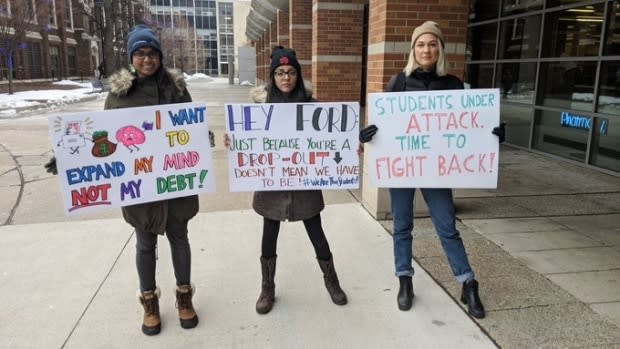'I live in constant fear of having to drop out': Students struggling with OSAP cuts
When Kaitlyn Jonescu isn't in class, she's working close to 30 hours a week and taking overnight shifts to pay for her education.
Jonescu, who is studying to be a teacher in the concurrent education program at Brock University, was saving up to buy her own car to commute to school when she learned about cuts to the Ontario Student Assistance Program (OSAP) last June.
The cuts hit her hard. Last year, Jonescu received a $2,020 grant and a $602 loan for school. This year, she received a $316 loan and no grant.
"I live in constant fear of having to drop out because of cuts," Jonesu said.
This year's loan won't even cover parking at Brock, which costs $330 for a semester. That meant her car savings went toward this fall's tuition, but now Jonesu says she's worrying about the approaching winter semester.
"I still don't know if I'll be able to pay off winter's tuition and it's terrifying."

Doug Ford's government announced changes to the OSAP program in January after the auditor general revealed that the previous plan from the Liberal government under Kathleen Wynne would result in costs of more than $2 billion annually by 2020-2021.
Some of Ford's changes to the program include the elimination of free tuition for low-income students, elimination of the interest-free, six-month grace period for graduates, a drastic decrease in grants and a ten per cent cut in tuition fees.
In an emailed statement, Ross Romano, the minister of training, colleges and universities, defended the province's changes to the program, saying it was "critical to restore financial sustainability to OSAP.
"The program had ballooned to its breaking point, and would not have been able to continue offering financial support vital to students across Ontario," Romano said.
"To do nothing to ensure the long-term sustainability of the Ontario Student Assistance Program would be irresponsible."
But as the changes take shape, some students who heavily relied on OSAP in previous years are now struggling.
'It's affecting my mental health'
Ryerson University student Ioana Radu says she is facing similar problems.
"I didn't even bother applying for OSAP this year … They were only going to offer me just under $1,000 for the full year," said Radu, who relied on OSAP in the past to help cover school-related costs and groceries.
The Kitchener native uses a bank loan to help with her tuition, but still has expenses associated with food, school supplies and more. As a result, she works 20 hours a week at her job at Lacoste while juggling an unpaid internship and classes.
"It's affecting my mental health … I'm constantly stressed about money," Radu told CBC Toronto.
Then there are the groceries. "I'm questioning whether I should 'splurge' on $4 pasta sauce or stick to the $2 can … I am literally worried about those $2 and it's insane to me," she said.
Harnoor Gosal, the coordinator of Ryerson's Good Food Centre, told CBC Toronto that there has been an increase in students accessing the centre this year.
The centre, which provides hunger relief for students struggling with financial obligations, had 55 new members sign up this year, Gosal said.
"From the 55 new students ... about 40 have shared the OSAP cuts as being the main reason … for support," she said.
'I find myself struggling 24/7'
While some students have accepted their new reality, others are trying to push back.
Hermes Azam, a Ryerson student who first came to Canada in 2009, is the chairperson of Ryerson's Student Strike campaign, which he calls "a grassroots movement organizing a strike to defeat these cuts."

He is receiving $2,500 less in funding this year compared to last. Azam said he works four days a week to try to pay his bills.
"I find myself struggling 24/7 … I feel far more exhausted and burned out from a full school workload and working," he said.
"The message we're trying to send Ford … is that these cuts are absolutely unacceptable and there's a prevalent mood of anger that exists within the student body," Azam added.
Feeling the stress
The stress of watching every dollar is a difficult reality that many Ontario students now live with. Ryerson student Shakir Rimzy said the stress sometimes makes it harder to maintain a healthy lifestyle.
The fourth-year student received $2,000 in grants from OSAP last year, but only $100 this year. He said he was notified about the decrease just two weeks before the semester started.

Rimzy said he wishes he were notified sooner of just how drastic the cut would be.
"If I knew earlier, I'd have my student line of credit lined up and signed, but they didn't give us enough time."
As an operator in the Royal Canadian Navy, Rimzy had some savings from his job to help pay for his tuition, but that came at the cost of having less money for other things.
"My social life has taken a hit ... The easiest way for me to de-stress is by hanging out with friends but even that comes with a cost," said Rimzy, who spends more time at home now.
"Sometimes I have to choose between going to an extra shift at work or going to class," he told CBC Toronto.
"You think you're doing all the right things and then with cuts like this, everything is gone."


